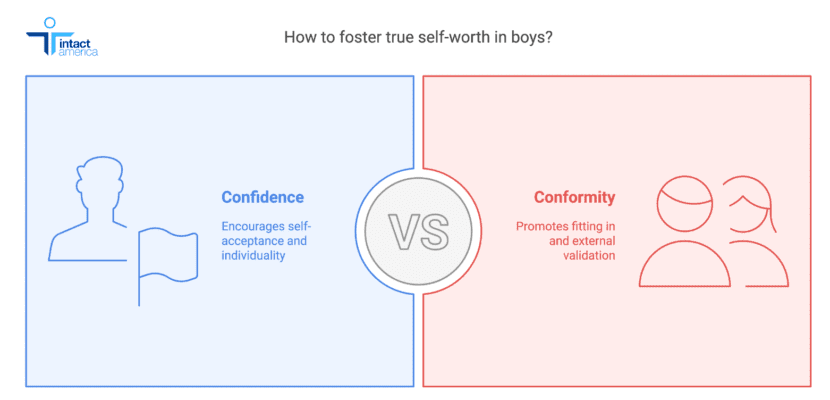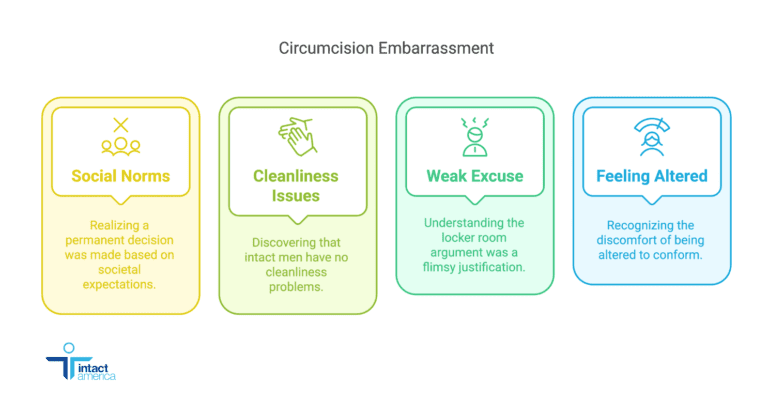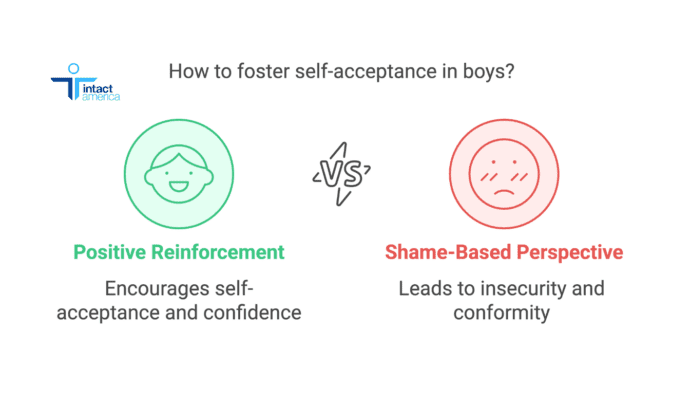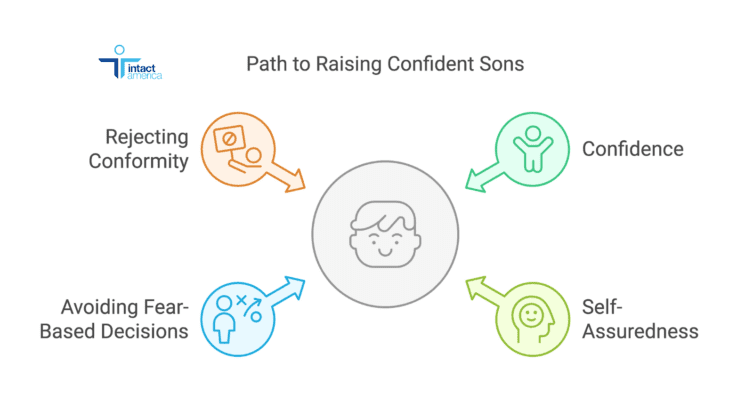
One of the most common defenses of circumcision is the so-called locker room argument:
“I don’t want my son to feel different from the other boys.”
But let’s break that down for a second. What are you actually saying? That you’re so afraid of your kid standing out that you’d rather surgically alter his body as a newborn than let him develop confidence and self-assurance on his own?
That’s not parenting. That’s cowardice.
Here’s what most people won’t tell you: The locker room argument is outdated. Circumcision rates are dropping. Your son isn’t going to be the odd one out—if anything, he’ll be part of a growing number of boys who were spared from an unnecessary cosmetic procedure at birth.
But even if that weren’t the case, here’s the real question: Since when is “looking like everyone else” a valid reason for unnecessary surgery?
Let’s say you’re in a gym shower, and you notice another guy has different ears than you—maybe his stick out a little more, maybe he has attached lobes instead of detached.
Do you assume his parents should have cut and reshaped his ears at birth to make them “match” the other guys’?
Sounds ridiculous, right?
Yet somehow, when it comes to circumcision, we act like altering a child’s genitals for aesthetic reasons is normal.
It’s not. It’s insane.
Confidence Over Conformity

The goal isn’t to make sure he blends in. The goal is to make sure he stands tall, no matter what.
Real confidence doesn’t come from looking like everyone else. It comes from knowing you’re good enough as you are.
A boy who grows up knowing his body was left whole—that his parents didn’t cave to outdated traditions or social pressure—will grow up with an advantage:
He knows his worth wasn’t up for debate.
Meanwhile, what about the boys who were circumcised for no other reason than conformity? Eventually, many of them find out the truth:
That it wasn’t medically necessary.
That it wasn’t cleaner.
That their parents did it so they wouldn’t “stand out.”
How do you think that realization feels?
What’s More Embarrassing—Being Intact, or Realizing You Were Cut for No Reason?

Let’s talk about embarrassment. Because, ironically, a lot of the same people who argue that intact men will feel insecure are the same ones who had this decision made for them as babies—without their consent.
And once a circumcised man starts digging into the facts, the real embarrassment kicks in:
- Realizing a permanent decision about your body was made based on social norms instead of logic.
- Finding out that intact men have zero issues with cleanliness or function.
- Understanding that the so-called “locker room argument” was nothing more than a weak excuse to keep an unnecessary tradition going.
If there’s one thing that should make you uncomfortable, it’s not being different—it’s realizing you were altered just to fit in.
Cutting Your Son Doesn’t Prevent Insecurity—It Creates It

Let’s entertain the worst-case scenario:
Your son is intact. He grows up. He ends up in a locker room or a bedroom with someone who has never seen an intact penis before.
What happens next?
He has two choices:
- Feel insecure and ashamed that he’s different.
- Own it, knowing his body is whole, healthy, and exactly how nature intended it.
Which outcome happens? It depends on how he was raised.
A kid who grows up hearing, “You’re perfect the way you are. We left you intact because you were born perfect,” will not be bothered by someone else’s ignorance.
A kid who grows up in an environment that treats differences as shameful, however, will feel the need to conform—no matter how irrational the expectation is.
And that’s why circumcision doesn’t prevent insecurity. It feeds it.
It teaches boys that their worth is based on matching rather than being whole.
That’s a poor lesson to pass down.
Conformity Is Weak—Confidence Is Strong

At the end of the day, which type of man do you want to raise?
A man who bases his confidence on whether or not he looks like the next guy?
Or a man who knows that his worth, confidence, and masculinity aren’t tied to unnecessary surgery performed when he was too young to consent?
If we want to raise confident, self-assured sons, we need to stop making fear-based decisions.
Conformity is for the weak. Confidence is for those who stand their ground.
Final Thought: Don’t Cut Your Son Just Because You Were Cut
Some dads push circumcision simply because they don’t want to admit they were robbed of a choice.
But that’s not logic—that’s justifying trauma.
If you weren’t given a choice, why would you repeat that mistake for your son?
If anything, you should be the first person to say, “I wish I’d had the choice—so I’m making sure my son does.”
That’s confidence. That’s breaking the cycle. That’s strength.
So forget the locker room argument.
Forget conformity.
Raise a son who knows he was never “wrong” or “incomplete” to begin with.
Because that’s what confidence looks like.






Edward M. Boyer
March 10, 2025 12:27 pmI read as much as I could but the type size and a weird preference for early illegible colored letters should be abandoned. People with 20-20 sight may find it disconcerting, the rest of us are shut out.
Since Intact America seeks followers it should revise the online format.
Edward M. Boyer
Kelly Floyd
March 18, 2025 11:42 amHi Edward, I’m sorry about the experience you had trying to read our blog. Do you happen to see a little orange box labeled “accessibility” in the lower left hand corner of your screen? You can use this feature to adjust text size, which may increase visibility.